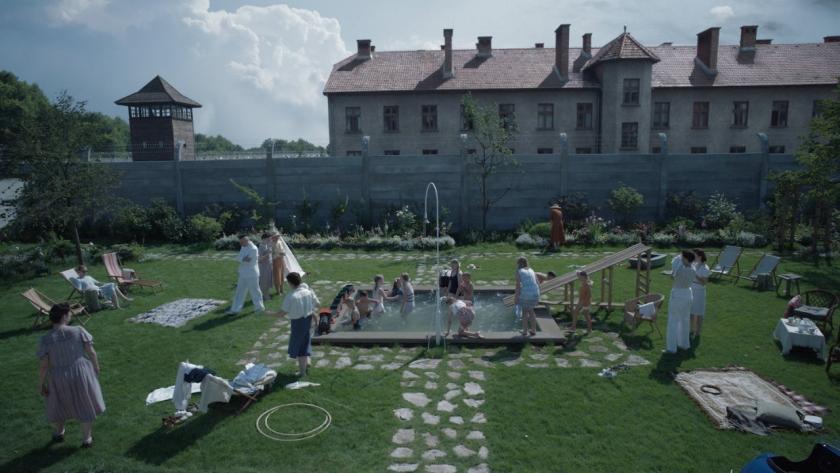The jokey serious point in Mel Brooks’s The Producers is that you shouldn’t be able to make a musical set among Nazis. But if you shouldn’t make a musical, can you make any fiction?
The renowned chronicler of the death camps, Elie Wiesel, said that a novel about Auschwitz is either not a novel, or not about Auschwitz. So that sounds like a “no” to Holocaust movies, too. It was a belief that gathered pace among many thinkers after Schindler’s List (1993), despite the Spielberg film’s widespread acclaim.
Mysteries that you puzzle at, surprising twists at strategic points, “character journeys”, suspense as to how things will turn out, survival against the odds – all these devices were embedded in Schindler, as they are in many movies. And they are all entertainment devices. But how can you kindle even a trace of entertainment out of the Holocaust?
The British director Jonathan Glazer looks to have thought deeply about all this, and he’s painstakingly avoided movieland’s usual story intrigues in his new feature, The Zone of Interest. The German-language film is a free adaptation of a Martin Amis novel about the life and times of the commandant of Auschwitz, Rudolf Höss, and takes place entirely outside the camp. Instead it shows us – in great, quotidian detail – the routines of Höss’s domestic life with his wife in their bourgeois dream house in the lee of the camp’s high concrete walls. The barrack buildings of “Auschwitz I” loom beyond the negative space of the couple’s commandeered retreat and huge, tenderly kept garden. (Astonishingly, the film was shot next to the camp itself.) Christian Friedel plays Höss; Sandra Hüller is his wife, Hedwig.
They’re first seen as a vanilla couple inside a soulless beige-grey dwelling that looks like pages from a house-beautiful magazine of the 1950s. They have a brood of chubby-cheeked kids to dote on. But Glazer doesn’t toy with this incongruity for long. Soon Höss is revealed as the callow technocrat of death that he is – as, in Höss’s home office, a contractor pitches ideas for a new camp crematorium. The workaday scene, with a salesman anxiously trying to press a deal as though he’s hawking kitchenware, is the first of several showing the German “normalisation” of genocide with a frigid naturalism.
We’re arguably at the fulcrum of history here, but Glazer’s strategy is to hammer the picture surface as flat as possible for as long as possible. As family, visitors, dogs, children and put-upon Polish servants potter mundanely about the house, they’re captured in an eerie whitewashed grade on multiple static cameras shooting simultaneously, as if on CCTV. Yet the audio side of the film is another story. It might be filtered out in the heads of the homeowners, but the rest of us are privy to an ambient soundscape drifting over the wall from the camp, which continues incessantly across the movie – dogs, gunfire, yelling, screaming, children crying – as if the whole of the rest of the earth is in pain.
You’re inclined to conclude that this shattering sonic mix, assembled by sound designer Johnnie Burn, constitutes the most important part of the film. Now and then an alarmist, Ligeti-ish score by Mica Levi joins in.
Back among the visuals, Hüller – playing the epitome of banal evil and standing for all who “looked on” in Nazi Germany – gives a pinpoint performance as Hedwig, the cheery viper hausfrau, as precise and unsettling as she was in last year’s Anatomy of a Fall. One minute she might be supervising strudel, the next trying on a fur coat and lipstick that have clearly come from camp inmates, or threatening a servant with incineration.
Story keeps threatening to break out in Glazer’s script, like an azalea in the Höss’s languid garden, and Glazer himself keeps shutting it down. Herr and Frau Höss’s marriage seems to be falling off a cliff, but we only get hints of their search for other company. One of their children sleepwalks at night. A mother-in-law turns up, offers some chilling anti-Semitic chitchat, and abruptly departs. The most obvious event is a non-event: Höss has to move away for a time and then gets sent back home.
Glazer has a story he doesn’t want to tell, and maybe a movie he doesn’t want to make. His need to make it bald and elliptical fights with a former ad man’s instinct to be ornate. And he strikingly combines the two in cryptic sequences of an intrepid Polish girl scattering fruit for inmates around the camp, shot in striking, black-and-white thermal imaging.
There’s an obvious answer to the Wiesel-esque argument against Holocaust fiction. How else will younger generations get to know this history? Glazer finds a solution to this, too, right at the end: in the present day, we see the vast collections of shoes and suitcases, and the ovens, at the Auschwitz museum, as cleaners hoover around them.
If Glazer’s last movie, Under the Skin (2013), veered towards the meretricious and his one before that, Birth (2004), was a bit too opaque, here we see a mix of experimental styles, singular subject-matter and a meticulous gaze that calls to mind Kubrick. The Zone of Interest combines intellect, artistry and film technique to an extremely high degree.













Add comment